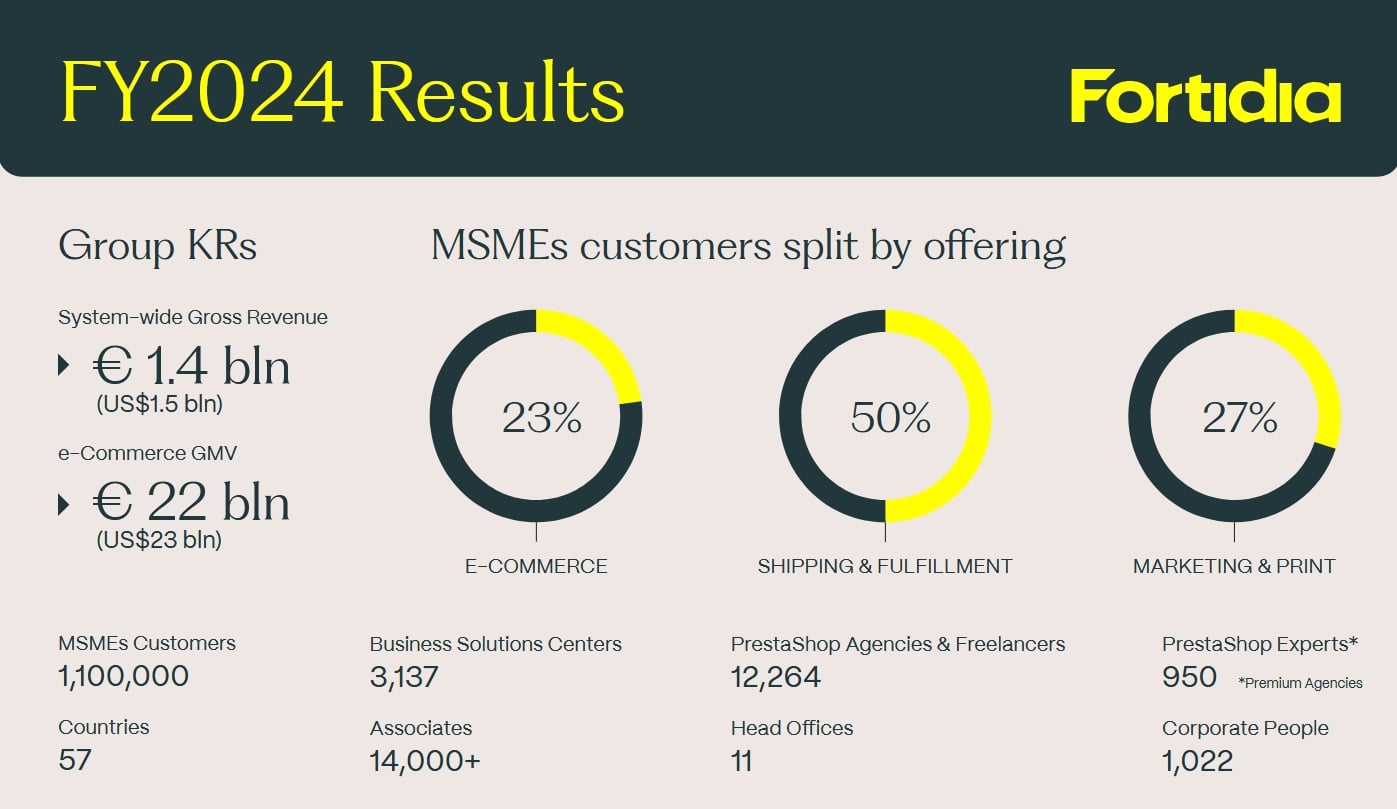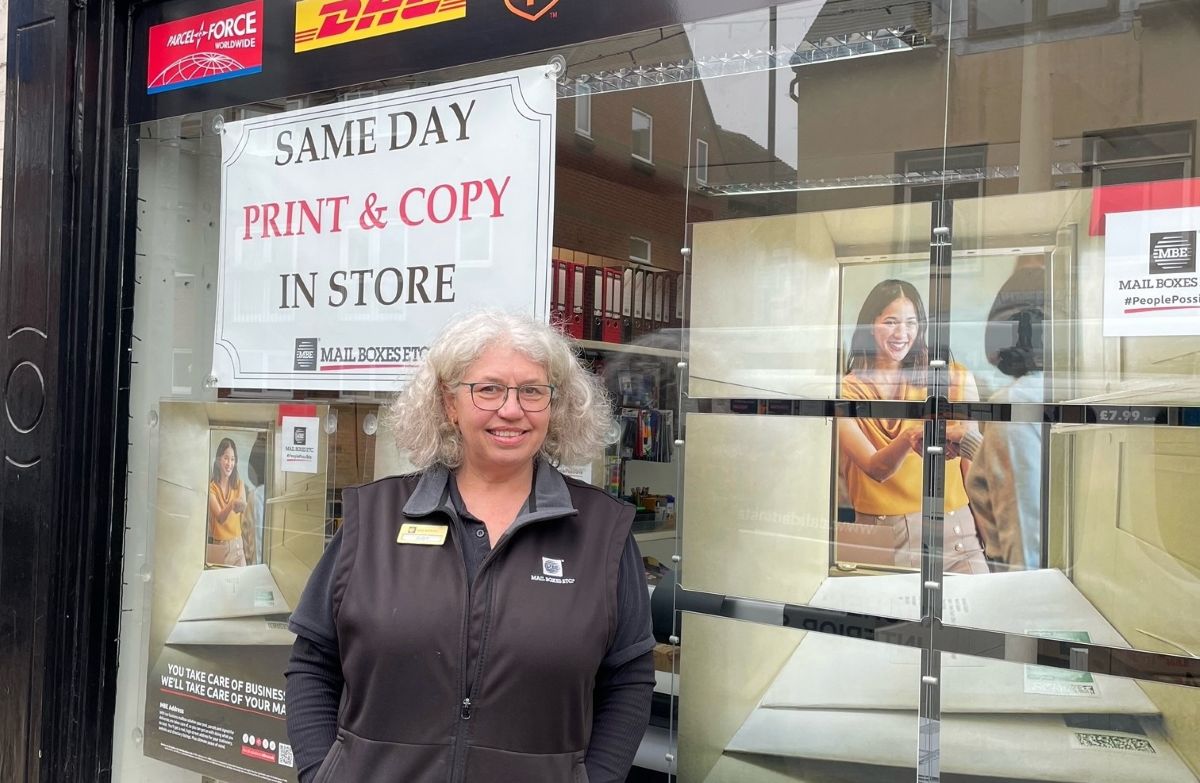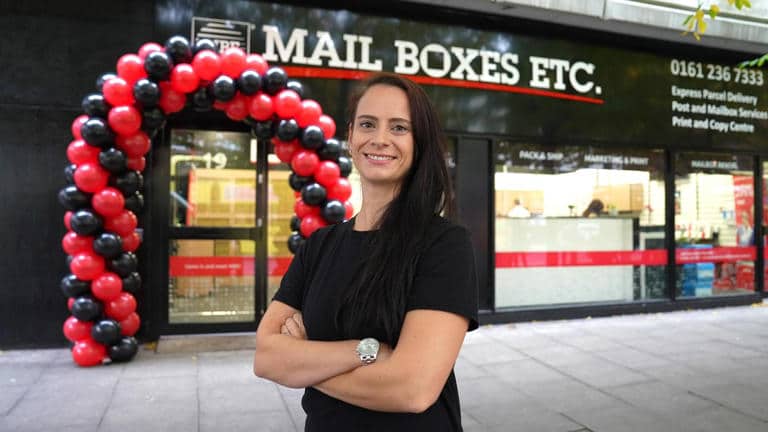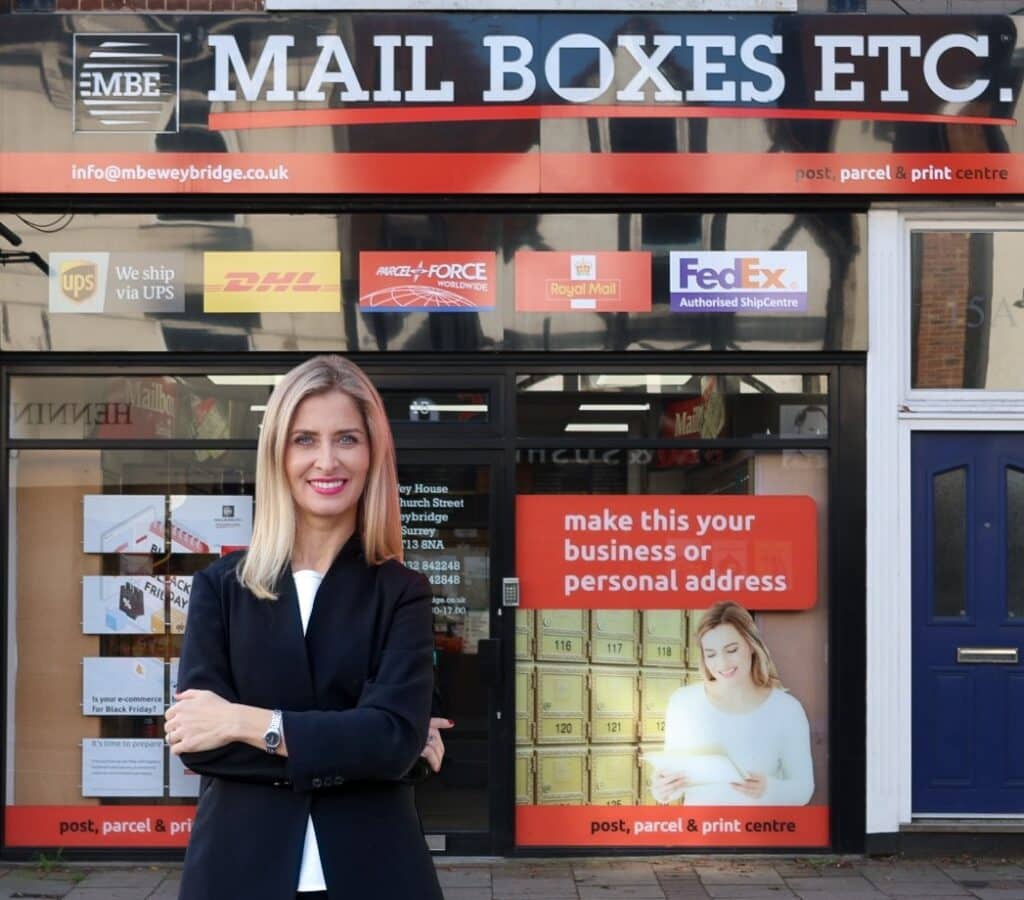
8-Point Plan Leads To A Leap In Turnover For Cardiff Centre

Jason Smith took over the MBE centre in Cardiff in October 2016. After 30 years in technical roles within digital print, he wanted to build his own business, leveraging his customer service and relationship-building skills and his knowledge of the print industry.
“The MBE franchise appealed because of its broad range of services, including packing and shipping, print, mailbox rental and virtual office services, which offered multiple revenue streams,” says Jason. “I saw strong potential to serve local businesses, students and residents in Cardiff and the surrounding areas and I liked the idea of creating a vital service hub for the local community.”
When researching franchise opportunities, he says,
“MBE’s brand reputation stood out. Its established and professional image, coupled with reliable business partnerships, was a significant draw.”
Starting a new business can be daunting, but once he had taken the step of becoming a franchise partner, Jason received training and support to build his business. He developed a solid reputation and a growing customer base, managing to navigate the challenges of the pandemic and emerge without too much damage to his turnover.
However, earlier this year Jason knew he wanted to give the business a boost that would take it into the second half of the 2020s, so he spoke to Naz Sen, Network Sales and Operations Manager at MBE and Mike Gratton, Managing Director, who worked with Jason to create an 8-point plan for accelerated growth.
Driving success
The plan aimed to drive success through collaboration, innovation and excellence. “The initial process with Naz and Mike was hands-on and collaborative. They helped me analyse my current sales processes, customer base and local market. We then developed a specific action plan for my centre, identifying prime target business areas.”
Jason then underwent practical training which helped boost his skills in specific areas, including making sales calls, running client meetings, refining his pitch and optimising his use of all the available software.
“They introduced me and my staff to the right tools for identifying B2B leads in Cardiff, shared best practices for outreach and helped me leverage the internal customer relationship and business management system.
“This training was pivotal, helping us log prospects, track interactions and plan follow-up, manage the sales pipeline and find the right marketing materials and price guides so our prospects had all the information they needed.
“Another incredibly useful tool was the ability to pull reports that would let me analyse sales activities and conversion rates, so I could spot trends and capitalise on the best opportunities.”
Significant shift
Jason believes this upgrade to his sales process represents a significant shift from a reactive to a proactive sales approach, fundamentally changing how he operates his centre.
“By using targeting businesses in Cardiff’s commercial districts and industrial estates, we were no longer reliant on walk-ins. My outreach became strategic, with tailored pitches for different business types – for example, secure shredding for legal firms, packing and shipping for e-commerce, bespoke deliveries for auction houses and galleries.”
Getting out into the field was another important move.
“I transitioned from being primarily an in-store manager to becoming a proactive sales manager, dedicating specific time each week to external sales activities.” Central to this new approach was developing the ability to delegate more in-store responsibilities to his trained staff, enabling Jason to focus on external outreach and business development.
Direct impact
Jason now feels incredibly positive and energised:
“While it was a substantial change to restructure my business approach, the outcome has been transformative. I feel much more in control of my growth trajectory with a clear, repeatable process for generating new business. My confidence in approaching new clients and articulating MBE’s value proposition has soared.”
He is excited about the future: “Seeing the direct impact of these efforts makes me genuinely optimistic about the future of my Cardiff centre. Replacing our previous haphazard approach with systematic, measurable growth has reduced uncertainty and boosted team morale.”
Jason’s implementation of the 8-point plan has directly translated into major year-on-year sales growth of 50% for Q1 2025. “A combination of my new, targeted approach and refined pitching led to securing several new business accounts and substantial recurring revenue.
“This growth was a noticeable leap from our previous turnover, establishing a new, higher baseline for my centre’s performance and demonstrating the direct return on the proactive efforts invested.”
Established Mail Boxes Etc. Franchise Business In Cardiff For Sale
The Cardiff Mail Boxes Etc. centre is now available for purchase. This is a rare opportunity to take over a thriving, high-performing franchise in a prime location, backed by a strong customer base and the proven MBE business model.
MBE Cardiff is ideally situated in a high-footfall area surrounded by students, residents, and local businesses, an ideal environment for continued growth. The business is well-established with a loyal customer base and runs smoothly within standard office hours, offering excellent work-life balance and operational simplicity.
This is a turnkey opportunity for anyone looking to step into a respected franchise brand. Whether you continue its current success or explore expansion opportunities, the Cardiff centre offers solid foundations and exceptional potential for future growth as part of the Mail Boxes Etc. network.

A Year of Growth, Innovation, and Strategic Expansion Across The Mail Boxes Etc. Network

The Fortidia Group closed FY2024 with €1.4 bln (US$1.5 bln) of System-wide Gross Revenue – generated through its location-based platform made of 3,130+ Business Solutions Centers in 57 Countries – and €22 bln (US $23 bln) of Gross Merchandise Value traded through its digital ecommerce platform.
Over the course of the year, Fortidia increased System-wide Gross Revenue and further expanded its international footprint, opening 149 new Business Solutions Centers and signing five new Master License Agreements in Argentina, Albania, Bangladesh, the Philippines and the Czech Republic.
In 2024, the Group underwent a major transformation, rebranding from MBE Worldwide to Fortidia – a new identity that reflects its expanded capabilities and ambition across the ecommerce, fulfillment, shipping, marketing and print sectors. The new Group identity encapsulates Fortidia’s mission to empower businesses – mainly Micro, Small and Medium-sized Enterprises – and consumers through an integrated ecosystem of physical and digital solutions.
“We continue to strengthen our role as a leading commerce enabler for MSMEs and consumers, leveraging the synergies of our physical platform combined with the digital one. In 2024, we supported the commerce needs of over 1.1 million business customers worldwide” said Paolo Fiorelli, Chairman and CEO of Fortidia. “Despite a challenging business environment Fortidia remained resilient. Our results reflect the ambition, tenacity, and passion of our entire team – from our Global Network of Partners to Corporate People – whose relentless focus continues to power our daily operations and long-term ambitions”.
Fortidia remains committed to innovating and evolving to meet the diverse needs of its customers across all channels in today’s fast-changing landscape. By combining the strength of its people with technology-driven solutions, the Group continues to deliver on its purpose: Empowering People locally to Power Business globally.

How To Buy A Franchise

Starting a business is an exciting but risky venture. Many independent start-ups struggle with marketing, brand recognition, and operational challenges, leading to a failure rate of nearly 50% within three years.
In contrast, franchises offer a proven business model, strong brand support, and structured training, significantly increasing the likelihood of success.
However, not all franchises are the same. To make the right investment, you need to choose the right franchise, understand the financial commitments, and follow a structured buying process. At MBE (Mail Boxes Etc.), we have helped hundreds of entrepreneurs transition into franchise ownership. This guide will walk you through the key steps to buying a franchise, from research to signing your agreement.
1. Define Your Goals and Budget
Before exploring franchise opportunities, you need to clarify your business goals, level of involvement, and financial capacity. Consider the following questions:
- What do you want from a franchise? Is it financial freedom, a career change, or a scalable investment?
- Do you want to be hands-on or hire staff? Some franchises require full-time commitment, while others allow semi-passive ownership.
- What is your budget? Franchise costs range from £10,000 (low-cost) to £200,000+ (high-investment models).
Writing down your ideal work schedule, financial targets, and risk tolerance will help you eliminate franchises that do not align with your vision.
2. Research and Compare Franchises
With your goals and budget in place, the next step is researching industries and specific franchise brands. Some of the strongest and most recession-resistant franchise sectors include:
- Logistics and courier services – Driven by growing eCommerce and business shipping needs.
- Business services – Including printing, marketing, and IT support.
- Food and beverage – Coffee shops, fast-casual dining, and takeaway services.
- Home services – Cleaning, repairs, and property maintenance.
To compare franchise options effectively, use the following table:
| Franchise Factor | What to Look For |
|---|---|
| Industry Demand | Is there consistent market demand? Look for franchises in growing or recession-proof industries. |
| Brand Reputation | Check online reviews, customer feedback, and franchisee testimonials. |
| Initial Investment | Compare franchise fees, setup costs, and required working capital. |
| Ongoing Costs | Look at royalties, marketing fees, and operational expenses. |
| Support & Training | What kind of assistance does the franchisor offer before and after launch? |
| Profitability & ROI | Check financial projections and talk to current franchisees about their earnings. |
By attending franchise expos, webinars, and discovery days, you can directly compare brands and ask franchisors detailed questions. Speaking with existing franchisees is another valuable way to verify claims about earnings and support.

3. Speak to Franchisors and Franchise Owners
Once you have shortlisted a few franchises, the next step is to contact the franchisors and request a Franchise Information Pack. This will typically include:
- Business model overview
- Investment and fee structure
- Profitability projections
- Training and support details
While franchisors will provide useful insights, existing franchise owners offer the most honest perspective. Ask them:
- How supportive is the franchisor?
- Did the business meet your financial expectations?
- What were the biggest challenges when starting?
- Would you buy this franchise again?
Visiting an operational franchise location is another way to get a real feel for how the business works.
4. Review the Franchise Agreement and Financials
A franchise agreement is legally binding, so reviewing all financial and legal commitments before signing is crucial. Key areas to examine include:
- Franchise fees and royalties – Initial franchise fees grant rights to operate under the brand, while ongoing royalties cover brand support.
- Marketing contributions – Many franchises require franchisees to contribute to a national or regional advertising fund.
- Contract length and renewal terms – Most agreements last 5 to 10 years. Check whether renewal is automatic and if there are renewal fees.
- Territory protection – Ensure that your agreement grants you exclusive rights to a territory to prevent oversaturation.
- Exit clauses and resale rights – Some franchises allow owners to sell their business, while others impose restrictions.
Consulting a franchise solicitor before signing will help you avoid unexpected costs and obligations.

5. Secure Financing If Needed
If you do not have the full investment amount upfront, several financing options are available. Banks often favour franchisees over independent start-ups due to the proven business model and lower risk.
Common funding sources include:
- Bank franchise loans – Many UK banks offer dedicated franchise financing.
- Government-backed start-up loans – Low-interest funding for new business owners.
- Franchisor financing – Some franchisors provide payment plans or financing options.
Before applying for a loan, prepare a business plan and financial projections to increase your chances of approval.
6. Attend Training and Launch Your Franchise
Once financing is secured and the agreement is signed, the final step is training and business launch. A good franchisor provides:
- Operational training – How to run daily business activities.
- Marketing support – Strategies to attract customers.
- Technology training – Understanding software, sales systems, and inventory management.
At MBE, franchisees receive comprehensive business training, ongoing marketing support, and access to a global logistics and printing network, enabling them to offer premium courier, printing, and business solutions from day one.
Pre-launch preparation, such as networking with existing franchisees and testing local marketing strategies, can help ensure a strong start.
Why Choose an MBE Franchise?
For over 40 years, MBE (Mail Boxes Etc.) has helped entrepreneurs build successful businesses across more than 40 countries. Our franchise model is ideal for:
- Business professionals seeking a scalable, high-growth business.
- Entrepreneurs looking for the security of a globally recognised brand.
- Investors searching for a profitable, well-supported franchise system.
What makes MBE unique?
- Multiple revenue streams – Franchisees offer a mix of logistics, courier, printing, and business services, creating strong recurring income.
- Comprehensive franchisor support – MBE provides full training, national marketing, and business development assistance.
- Proven profitability – MBE’s structured model has helped many franchisees achieve long-term success.
With an established reputation as one of the world’s largest business services franchises, MBE offers a strong, scalable business model with long-term growth potential.
Is Buying a Franchise Worth It?
Franchising is a proven way to start a business with reduced risk, but success depends on choosing the right franchise and following the right steps.
By defining your goals, researching opportunities, speaking with franchisees, reviewing financial commitments, and securing financing, you can make an informed investment that aligns with your skills and lifestyle.
If you are ready to explore an MBE franchise, download our Franchise Information Pack and take the first step toward business ownership today.

What Strategies Help a UK SME in Logistics Stay Competitive

The rise of the internet—and the explosive growth of e-commerce in recent years—has dramatically reshaped how goods move and how services are delivered. It’s no longer enough for logistics providers to focus solely on getting from A to B. The market now demands speed, reliability, flexibility, and digital readiness.
On one hand, the expanding number of online shoppers offers a significant opportunity for logistics SMEs, especially those operating locally. On the other hand, these businesses face mounting pressure to stay competitive in a fast-changing and increasingly tech-driven industry.
Building a competitive advantage is far from simple. It requires:
- Access to advanced technologies.
- Investment in infrastructure and skilled personnel.
Agility to respond to customer expectations and market trends.
Large corporations can afford this with relative ease. Smaller businesses and start-ups often struggle, limited by tighter budgets and reduced access to specialised expertise.
But there are smart ways forward. Franchising—especially with a recognised logistics brand—offers SMEs a powerful way to scale, access best-in-class resources, and strengthen their market position. With the right support structure, small businesses can benefit from the strength of a large network while retaining their independence and customer-first approach.
The Business Case: Why Competitive Advantage Matters
- The continuous growth of online shopping has opened up fresh business opportunities for logistics providers, especially those serving both individuals and SMEs
To stand out, service businesses must invest—financially and strategically—to deliver exceptional experiences that drive customer retention and word-of-mouth referrals.
Four Key Strategies for Building A Competitive Advantage in Logistics
1. Invest in People: Ongoing Training and Development
Many SMEs underestimate the importance—and cost—of staff development. But in service industries like logistics, your people are your product. A knowledgeable, proactive team can be the difference between a loyal customer and a missed opportunity.
Professional development shouldn’t be viewed as a luxury. It’s a long-term investment. Franchising can ease this burden. By joining a network like Mail Boxes Etc., SMEs gain access to structured training programmes, including onboarding, operational procedures, tech support, and customer service coaching.
In a fast-changing sector, upskilling your team is essential to remain competitive.
2. Embrace Digital Transformation
According to the European Commission’s DESI 2022 report, just 55% of SMEs across Europe have adopted even basic digital tools. That’s a competitive risk in itself.
Digitalisation is no longer optional. It affects every area of a logistics business—from quoting and tracking to billing and customer communications. Without automation and real-time data, small businesses risk falling behind. Customers now expect speed, transparency, and self-service capabilities.
By joining a franchise like MBE, SMEs gain access to centralised platforms, automated processes, and up-to-date software—all of which would be cost-prohibitive to develop independently.
3. Strengthen Your Brand Image
A strong brand builds trust. Yet many SMEs neglect branding, often due to limited budgets or in-house skills. According to MarketingSignals, 37% of failed e-commerce start-ups cite poor visibility and branding as a contributing factor.
Professional branding isn’t just about a logo. It’s about consistency, tone of voice, visual identity, and trust signals. Being part of a respected brand like MBE allows independent businesses to leverage a proven identity, backed by nationwide recognition, professional marketing tools, and pre-designed promotional assets.
When customers feel confident in your brand, they’re more likely to buy—and return.
4. Adapt to Fluctuating Demand and Scale Flexibly
Logistics companies face seasonal and unexpected spikes in demand. From Black Friday to unforeseen supply chain disruptions, the ability to scale up (or down) quickly is vital.
Small businesses often lack the infrastructure, manpower, or tools to absorb these peaks without disruption. Delays or errors during high-demand periods can damage reputations and customer trust.
Through franchising, businesses can plug into a larger network of shared systems, standardised procedures, and scalable resources—making it easier to meet rising demand while maintaining service levels.
The Competitive Advantage of Partnering with MBE
With decades of experience and a globally trusted brand, Mail Boxes Etc. offers its franchisees a competitive edge through a proven and fully supported business model.
Franchise Partners benefit from:
- A comprehensive suite of services across logistics, shipping, printing, marketing and e-commerce support.
- Continuous training tailored to market needs and evolving customer expectations.
- Access to cutting-edge digital platforms and process automation tools.
- National and international brand credibility, which opens doors to more clients.
- A network of like-minded professionals and shared best practices across the MBE system.
For SMEs looking to grow, stay competitive, and deliver a first-class experience to their customers—MBE offers the tools, knowledge, and support to get there.
Ready to Strengthen Your Business?
If you’re a logistics provider or service-based SME looking to build a long-term competitive advantage, MBE can help.
Get in touch to learn more about joining our franchise network and taking your business to the next level.

Whats The Best Franchise To Invest In

Investing in a franchise is a significant financial decision that can provide a clear and structured path to business ownership. If you’re wondering what’s the best franchise to invest in, the answer depends on your goals, skills, market conditions, and the research you’re willing to undertake.
This comprehensive guide, which includes a closer look at how owning a Mail Boxes Etc. (MBE) franchise aligns with these principles, will help you identify the best opportunities, evaluate potential franchises, and build a strategy for long-term success.
Opportunities: Industries with High Potential
The franchise market offers opportunities across a variety of industries. To identify the right fit, follow these steps:
1. Match Your Skills and Interests to the Industry
- Reflect on your strengths and preferences. Do you enjoy working with people, managing logistics, or focusing on creative projects?
- Example: If you thrive in fast-paced environments, a food franchise like McDonald’s might suit you. If you prefer a diverse business model with multiple revenue streams, consider a logistics franchise like Mail Boxes Etc.
2. Explore Growing Industries
- Logistics and Shipping: Franchises like Mail Boxes Etc. (MBE) and Pack & Send are thriving due to the e-commerce boom. MBE stands out with its combination of courier services, printing, packaging, and mailbox rentals, catering to small businesses and remote workers.
- Food and Beverage: Global chains like Subway (£50,000+ investment) or emerging brands like Creams Café (£70,000+) offer established business models.
- Fitness and Wellness: F45 (£500,000+) or boutique gyms like Barrecore (£40,000+) cater to health-conscious consumers.
- Childcare and Education: Affordable franchises like Kumon (£3,000–£5,000) or Tutor Doctor (£33,000) appeal to parents prioritising education.
- Eco-Friendly Franchises: Sustainable businesses like Green Cleen (£15,000) are gaining traction.
3. Research Franchise Trends
- Use tools like IBISWorld, Mintel, or The British Franchise Association Reports to identify trends.
- Example: The UK’s elderly care sector is expanding rapidly. Home Instead Senior Care (£40,000+) offers the chance to serve a growing market while building a profitable business.
4. Find Franchises That Fit Your Budget
- Low-Cost Options: Consider home-based franchises like Agency Express (£24,500) or Barking Mad (£15,000).
- High-Investment Opportunities: If you have access to £1 million+ in capital, look at established brands like KFC or Marriott Hotels.
Evaluation: How to Choose the Right Franchise
After shortlisting potential franchises, including Mail Boxes Etc., take these steps to evaluate each one thoroughly:
1. Understand the Financial Commitment
- Request a breakdown of all costs, including:
- Franchise fees (£5,000–£100,000+).
- Equipment costs: MBE franchises may require specialised printers, packing equipment, and point-of-sale systems (£20,000–£50,000).
- Royalties: Typically 5–10% of gross sales.
- Marketing contributions: 1–5% of monthly revenue.
- Pro Tip: Maintain 20% more than the franchisor’s estimated costs for unexpected expenses.
2. Review Financial Performance Data
- Ask for audited financial statements, including average gross revenue, profit margins, and time to break even. For example, MBE franchises typically achieve profitability within the first 18–24 months, depending on location.
3. Speak to Franchisees
- Contact 3–5 current franchisees. Ask specific questions:
- How much support did you receive during setup?
- What challenges have you faced in operating the business?
- What is your monthly revenue after 12 months?
4. Analyse the Franchise Agreement
- Hire a solicitor to review clauses about:
- Territory exclusivity: Ensure no competing MBE franchises will operate in your region.
- Renewal terms: Confirm you can renew under similar conditions.
5. Assess Local Market Demand
- Use Google Trends and ONS Statistics to gauge demand. For example, MBE franchises thrive in areas with a strong small business community or high e-commerce activity.
Advice: Steps to Maximise Success
Once you’ve chosen a franchise, implement these strategies for long-term growth:
1. Secure Financing
- Approach banks offering franchise loans, such as Lloyds or HSBC. Prepare a business plan that includes:
- Cost projections, including equipment and marketing expenses.
- ROI and break-even timelines.
2. Plan a Local Launch Campaign
- Allocate at least 10% of your start-up budget for marketing.
- Specific tactics for MBE:
- Partner with local small businesses to promote MBE’s printing and courier services.
- Distribute flyers targeting nearby e-commerce sellers and remote workers.
- Run targeted Facebook Ads (£500/month) focusing on local business owners.
3. Automate Operations
- Use tools like Xero or QuickBooks for financial tracking.
- Implement customer management systems like HubSpot or Zoho CRM.
4. Measure and Optimise Performance
- Track key metrics monthly:
- Revenue growth and profit margins.
- Customer retention rates.
- Marketing campaign performance.
5. Expand Strategically
- MBE offers opportunities to scale by opening additional locations or diversifying revenue streams. Work with the franchisor to identify growth opportunities in new territories.
Why Mail Boxes Etc. Stands Out
Owning a Mail Boxes Etc. franchise is an excellent example of how to implement the strategies outlined in this guide. MBE provides a proven business model with diverse revenue streams, including courier services, mailbox rentals, printing, and packaging.
This flexibility makes it well-suited to entrepreneurs looking to cater to small businesses, remote workers, and e-commerce sellers. With robust franchisor support, including training, marketing resources, and operational guidance, you’ll have the tools needed to succeed.
By leveraging the steps in this guide—evaluating local market demand, automating systems, and planning targeted marketing campaigns—you can maximise your investment and build a thriving business within the MBE network.
Final Thoughts
When asking what’s the best franchise to invest in, the answer depends on your interests, financial capacity, and the diligence you apply to research and evaluation.
Franchises like Mail Boxes Etc. exemplify the combination of proven systems and growth potential that investors should seek. By following this guide, you’ll be equipped to make informed decisions and create a path to long-term success.

International Women’s Day Profile: Judy Veniamaki

Mail Boxes Etc. has many successful women franchisees and centre managers across its network. To celebrate International Women’s Day this year, we spoke to Judy Veniamaki, who runs Mail Boxes Etc. Chichester.
After six years of secretarial work and office admin in the UK and twenty-five years in Greece working in tourism and hospitality, Judy joined the team at MBE Chichester with Kal Chudasama when he took over the franchise in 2016. They learnt the job together and very quickly became a team.
As manager of the store, Judy enjoys the variety of the business, which includes mailbox rental, packing and shipping parcels to destinations around the world, and looking after customers’ print requirements.
“It’s very important to me to build strong relationships with our customers,” she says, “and to ensure our service meets all their expectations. Communication is vital – especially if people are ordering online. When people use us to ship their items, we make a point of notifying them of the progress of their consignment every step of the way.”
Antiques And Art Shipping
A lot of Judy’s shipping work is focused around valuable and fragile items. “We collect antiques and works of art from local auctioneers and antiques shops, which makes each job a very personal and unique experience for everyone involved.
“We get to handle some lovely items which are very precious to our customers and we pride ourselves in taking the best possible care, from packing breakable pieces with expertise to choosing the right carrier to handle the packages.”
Over the years, Judy has had to learn plenty of new skills, including specialist packing techniques and making sure she’s on top of customs requirements. She loves the fact that each day brings something different: “We never know what the next job will be, and I like the thrill of each new request. We discuss each consignment as a team and our different approaches mean we’re sure to cover all bases to ensure each customer has the right solution for their needs.”
Judy’s customer base includes mailbox customers, from private individuals and small businesses to remote users who have their mail forwarded. “Our services are very well suited to SMEs, as we can often help them by taking on their shipping needs too, which frees their time up to focus on other parts of their business.”
When it comes to growing the business and being able to offer customers new solutions, Judy says:
“We are particularly pleased with how we have increased our print services by investing in a new Xerox finishing machine, which enables us to produce leaflets, business cards and booklets quickly and professionally. We also have a wide format printer, which has proved to be popular as we offer a same-day service. Our customers find this really useful for everything from plans and legal documents to posters, and they love the fact that the turnaround is so speedy.”
Female Friendly Business Model
Anyone running their own business faces challenges, but Judy believes Mail Boxes Etc. is a business model that’s very well suited to women. “In this line of work, attention to detail is imperative, and I think most women are skilled in this area. Thinking outside the box is a good thing, too.
“It’s great to be part of a team. As manager of the Chichester store I have the support of my colleague Abi, which is so important. We work very well together, and we both really care about our customers. I think that shows when you read our online reviews; our customers are more than happy to share their positive feedback.”
Judy finds that the work-life balance at the store suits her very well.
“Although always busy, I’m never overwhelmed in my role. Working with another woman is great and we love working for Kal, he’s a fantastic boss, very supportive and encouraging.”
How To Make A MBE Franchise Successful
Judy’s advice for anyone thinking of working in, or owning, an MBE franchise is to get a good team together: “So necessary when you run a small business.”
She also says women should work on self-belief:
“Your past career choices teach work skills every step of the way; use them to build your own success. I am working in retail now, but my time in hospitality gave me the skill of attention to detail, while working in tourism taught me to think quickly to find a suitable solution. All the new technology needs to be embraced, but that’s true in any job, and change is hard for most people, but accepting it and learning new skills will keep your business – and your mind – growing.”

Franchisor Brand: Support Roles and Expectations

Joining a business model provided by a franchisor is a valuable opportunity that offers those who intend to set up their own business the advantage of being involved in a consolidated system based on proven methods and benefiting from the support of an established brand for their business, from the start-up phase.
One of the main difficulties that those who want to start a new business must face is the immediate availability of economic resources and tools, but above all the need to build their own brand and a customer base from scratch. Relying on a franchisor allows you to enter a commercial network already consolidated on the market and to be able to count on a low-risk and low-cost commercial operation.
Affiliation with a franchisor allows you to save on organizational costs that weigh on those who start a business from scratch and often includes a design plan for the layout of the store and furniture.
But who is the franchisor? How important is his support? And what services can you expect when you decide to open a franchise?
Point 1: Being part of a franchise network offers the opportunity to leverage proven methods to start your new business.
Point 2: One of the most important advantages of a franchise business model is the ongoing support and constant backing of an established brand.
Who the franchisor is and what his obligations are
The franchisor is the parent company that grants its affiliates, called franchisees, the right to use its brand, its products or services and its know-how to develop their business. In addition to providing a consolidated business model, the franchisor defines the operational guidelines that guarantee the uniformity and quality of the entire network, thus contributing to the start-up and consolidation of affiliated commercial activities.
Among the franchisor’s main obligations is the creation and constant updating of the management model, integrating innovations and market strategies to keep the entire commercial network competitive. Furthermore, it must monitor and support its affiliates, not only in the start-up phase, but also throughout the duration of the contract, with training tools, updates and personalized promotional plans.
However, its role is not limited to operational support: the franchisor acts as a strategic guide, facilitating market entry and promoting the expansion of affiliated businesses through industry analysis and solutions that respond to market challenges. This balance between the managerial autonomy of franchisees and the duties of the franchisor is one of the key elements of this business model.
In addition to these aspects, one of the main obligations of the franchisor is to ensure transparency and fairness towards its affiliates. This includes providing clear and detailed information on the business model, the costs of affiliation and the performance guaranteed by the commercial network. Furthermore, the parent company is required to respect contractual agreements, for example by providing the agreed support and ensuring that the affiliates can operate in a competitive environment free of internal conflicts, such as unauthorized territorial overlaps.
A further obligation of the franchisor concerns the supply of goods or tools necessary for the activity, an element particularly relevant in distribution franchising, but also present in service franchising. Finally, it is the franchisor’s obligation to transmit to its affiliates the distinctive signs of the brand, guaranteeing them the right to use trademarks, signs and other elements of industrial or intellectual property that identify the brand.
The most important types of franchisor support
The franchisor’s support for new affiliates can vary significantly based on the type of contract and the sector, however there are some services that constantly characterize the start-up phase of a new business and which can be fully included among the advantages of franchising. Here are the most important types of support offered to affiliates:
- Support in identifying possible financing options. Having an overview of the expenses to be incurred is important especially in the start-up phase of the business, also in order to determine an effective operational plan.
In this context, in addition to the assistance provided by their own consultants, it is clear how important it is for affiliates to be supported by the parent company in order to evaluate any available financing options necessary to be able to meet the expected costs.
- Equity, loans, grants or subsidies: the franchisor’s support will be useful to analyze the different options and help you choose the one best suited for your business.
- Location selection. The brand’s support in selecting the physical location is important. In addition to the evaluation and choice of location for the new business, franchisees are sometimes provided with an indication of an exclusive geographic area within which no other centers will be authorized to open (except for any specific exceptions provided for in the franchising contract).
Only then will the works compliant with local building regulations have to be carried out in to develop the space according to the brand requirements: thanks to the franchisor’s support, it is possible to prepare a detailed design plan for the furnishings, layout, and furniture with particular attention to cost optimization and expense containment.
- Training and operating methods. Training is certainly one of the most important support services provided by the franchisor to the benefit of affiliates, essential for learning how to effectively manage the new business. In addition to informing affiliates about operating methods and providing instructions for completing all processes and management protocols correctly, continuous training is a fundamental tool for ensuring the achievement and maintenance of quality standards, learning about any product or service innovations, from new equipment to software.
In-store or in the field, the focus should therefore be on the basics of how the system works, in particular on acquiring skills for business development. Initial training courses are often supplemented by additional training sessions to constantly support know-how and develop professional sales skills. In addition to training, administrative and technical support can be provided in the initial phase in order to improve performance and ensure better adherence to brand standards. - Framework agreements. Among the support services that a franchisor can provide to affiliates is also the possibility for affiliates to benefit from framework agreements signed by the parent company with certain suppliers of products or services.
Franchisees are advised to purchase from approved suppliers, with the aim of promoting economies of scale and working with suppliers capable of offering a consistent level of quality across the network.
- Advertising and Marketing. Advertising and marketing are two essential components for the introduction and promotion of a new business. This is why they cannot be missing from the franchisor’s support activities for affiliates: in addition to obtaining practical guidance and assistance for the inauguration, affiliates can receive assistance in starting campaigns to promote brand awareness and take advantage of marketing solutions designed specifically for the business in question, to reach customers online and offline.
Why choose MBE as your franchisor?
An internationally established network like MBE can offer several business tools to those who open a franchise, as well as a wide range of services that allow local businesses and residents to solve everyday challenges. Becoming an MBE franchisee means joining a network of 1,800 Service Centers worldwide: a system that provides continuous support and assistance to optimize your time.
MBE promotes entrepreneurship and provides all the ingredients needed to start a new business in a dynamic sector, such as that of services to businesses and individuals: the solution for those who want to start a new business counting on the solidity of an established brand or for those who are already entrepreneurs and intend to invest in the services sector.
MBE training is not limited to the start-up phase of the business. However, it is an integral part of a system that aims to enhance and increase the talent of the affiliates and their team. MBE includes updates on the new solutions proposed, meetings and workshops with a focus on business development and on new technologies and digital innovations to offer to customers.
The training takes place in the classroom, online and in the field, where expert Entrepreneurs are often involved who act as Certified Centers, specialized in supporting new entrepreneurs. In this way, a relationship is established between experienced senior entrepreneurs and new affiliates, where the interaction with expert and competent figures is one of the elements of great value that distinguishes the MBE world.
In addition to training, MBE also provides constant support from the Network thanks to teams of experts working in the area. Figures in close contact with the affiliates, who support the franchisees from the start of the business. Training and support in MBE are one of the elements of great value for those who choose to become part of the MBE Network.
Contact us and discover our business model

Franchising: What It Is and How It Works

How Franchises Work
Franchising methods vary depending on the industry and business type. Below are examples of how franchising operates across different sectors:
Industrial
Common in industries like restaurants, this model involves the franchisor providing not just the license and brand but also production techniques and technologies. The franchisee operates as part of a network, producing and distributing goods under the franchisor’s guidelines.
Distribution
In this arrangement, the franchisee receives knowledge and commercial techniques to sell products. In return, they pay the franchisor an initial entry fee or ongoing royalties to access the franchise’s established systems and resources.
Services
Focused on selling services rather than products, this model is widely used in sectors such as travel and consultancy.
Organisational Models
Franchises can also be structured based on how the franchisor and franchisee collaborate:
- Direct: The franchisor partners with local operators to establish a brand in a foreign market, particularly where the brand is already well-known.
- Indirect: The franchisor involves a third-party investor who assumes the financial risks and responsibilities, often used for culturally or geographically distant markets with complex distribution needs.
Franchising benefits both parties. The franchisor expands their network and brand presence without managing physical locations, while the franchisee leverages a proven business model to reduce the risks of starting a new venture, even without industry experience.
How to Open a Franchise: Costs to Consider
Starting a franchise requires evaluating both operational and financial commitments. While franchisors provide significant support—ranging from skills transfer to operational compliance—there are specific costs involved:
- Entry Fee: A one-time fee granting the franchisee the right to join the business.
- Turnover Percentage: A share of profits, often paid periodically or for the entire duration of the partnership.
- Advertising Contribution: A fee to support national or local marketing campaigns initiated by the franchisor.
- Additional Costs: This may include expenses for tools, equipment, or bank guarantees for securing goods.
MBE Franchising: A Global Network
MBE’s franchising system offers internationally negotiated agreements, enabling franchisees to overcome challenges through effective teamwork and constant operational support.
With over 1,600 service centres worldwide, joining MBE provides access to a global network of entrepreneurs.
Franchisees benefit from extensive assistance, training, support, and potential financial advantages.
By partnering with Mail Boxes Etc in the UK, you gain the tools to establish a successful business while contributing to the shared achievements of a thriving global network.

Unveiling Fortidia: MBE Worldwide Group’s New Identity

MBE Worldwide – a privately held multinational company headquartered in Italy and operating globally – changes its Group brand identity to Fortidia, and consolidates its international positioning in the e-commerce, fulfilment, shipping, marketing and print sectors, addressing the market with a brand that fully encapsulates the essence of the Group’s capabilities and aspirations.
Fortidia is the new home for the Group’s brands: PrestaShop, Mail Boxes Etc., PostNet, PACK & SEND, World Options, AlphaGraphics, Multicopy, Print Speak, GEL Proximity and Spedingo. All Fortidia brands are united by a shared vision: to multiply opportunities for businesses and consumers, thus supporting those customers in achieving their ambitious goals.
“We are at a pivotal moment in the life of our Group. As we continue to grow and expand, we felt the need to define a Group branding that better represents our common mission and aspirations,” says Paolo Fiorelli, Chairman and CEO of Fortidia.

The Group started in 1993 when the Fiorelli family commenced operations in shipping and fulfilment in Italy under the Mail Boxes Etc. brand. In more than three decades since, the Group has expanded strategically into additional areas including e-commerce, digital solutions, and marketing and print, emerging as a leading platform for global commerce for SMBs and consumers.
In 2023, the combination of its physical platform -including 3,200 Business Solutions Centres in 60 countries – with its PrestaShop e- commerce platform served 1.1 mln business customers worldwide generating €1.4 bln (US$1.5 bln) of System-wide Gross Revenue and €22 bln (US$23.8 bln) of Gross Merchandise Value.
Reflecting these foundations, Fortidia is not just a new identity, but rather, an embodiment of the current and future vision of the Group. The name derives from the Latin expression “Fortis Idea,” symbolising a combination of strength, courage, and reliability, along with reflecting the Group’s belief in the ability of people to make a
difference and sustain continuous growth over time.
“The new branding reflects our unwavering commitment to helping businesses and consumers multiply opportunities thus accomplishing their ambitious objectives. Our strength, resilience, and daily dedication to customers’ growth are symbolized by this powerful name,” Fiorelli concludes, emphasizing how “this is reflected in Fortidia’s
purpose: Empowering People locally to Power Business globally.”

Mail Boxes Etc. relaunches Manchester Piccadilly as Northern Flagship

Mail Boxes Etc. has relaunched its Manchester Piccadilly service centre as a flagship store for the North of England, which will double up as a training centre for its national franchise network.
Mail Boxes Etc. is the world’s leading third-party provider of shipping, fulfilment, print and marketing solutions to small and medium enterprises and consumers, with a network of over one thousand eight hundred franchise locations in forty eight countries.
The Italian-owned company has now completed a total overhaul and relaunch of the Lever Street store in Manchester city centre, which previously suffered significant flooding damage in late 2023.
Featuring the very latest branding and facilities, the revamped store will now serve as a benchmark outlet, and a training facility for the company’s over one-hundred franchisees from across the country.
Mail Boxes Etc. Learning & Development Manager Lauren Singleton said: “We’re incredibly proud to relaunch our Manchester Piccadilly store as a national flagship outlet and training centre for our national network.
“As a brand, Mail Boxes Etc. is currently bucking the trend on UK high streets and is one of the few chain store outlets opening more stores.
“We believe that’s because our service range meets a growing need, especially with the boom in ecommerce and working-from-home businesses, as well as many companies who in the past might have traded locally now trading nationally and internationally, who want a professional solution for shipping worldwide, or a postal mailbox separate to their operational or residential address.
“For shipping, we take away the burden of choosing the right shipping partner for each package and help with documentation to ensure packages arrive with less likelihood of delays, and our packing solutions are extremely attractive to people exporting and importing fragile items.
“In an increasingly online world, we are proud to still maintain that walk-in capability, where you can discuss your needs with a living, breathing human, which is why training of our franchisees is so important.
“The Manchester Piccadilly outlet will now be a central component of our training ongoing, while also providing access to all our facilities for the people living and working in the vibrant heart of one of the UK’s most exciting cities.”

The new owner of Mail Boxes Etc. Weybridge aims to enhance local business imports and exports.

Having taken over the Mail Boxes Etc. in Weybridge, the new owner has outlined her vision for the store to help local businesses better import and export worldwide
Nessy Vallis acquired the Mail Boxes Etc. business, which has been a fixture on Church Street for around twenty years, in September this year, following a successful fourteen-year career in international sales, specialising in the print industry.
Her ambition in growing the service centre as part of the local community is to develop relationships with key customers from the surrounding areas to help them trade nationally and internationally, while also aiming to grow the walk-in design and print offering for local businesses too.
Outlining her growth plans, she said: “Mail Boxes Etc. is the world’s leading third-party provider of shipping, fulfilment, print and marketing solutions to small and medium enterprises and consumers across the globe, with a network of over one thousand eight hundred franchise locations in forty eight countries.
“As a brand, it’s currently bucking the trend on UK high streets and is one of the few chain store outlets opening more stores, which I believe is because its service range meets so many growing needs.
“For instance, the emergence of so many ecommerce and working-from-home businesses in Weybridge and the surrounding areas means there are a huge number of people who want a professional solution for shipping worldwide, or a postal mailbox separate to their operational or residential address.
“For shipping, we take away the burden of choosing the right shipping partner for each package and help with documentation to ensure packages arrive with less likelihood of delays, and our packing solutions are extremely attractive to people exporting and importing fragile items.
“We also specialise in securely sending sensitive and high value paper documents, and our mailboxes provide a great solution for businesses operating from home who would rather not share their home address with customers.
“I’m looking forward to bringing all that to the people and businesses of Weybridge, helping local entrepreneurs and established businesses to go national and international, with a friendly, face-to-face customer service through our high street service centre.”
Mail Boxes Etc. is part of MBE Worldwide, which in 2023, served over one million business customers worldwide through its multi-brand operations, generating €1.4 billion.

Top Growing Business Sectors for Investment
Market Trends and Key Economic Sectors Offering the Best Investment Opportunities

Investing in expanding economic sectors is a strategic decision for entrepreneurs and investors keen to capitalise on market opportunities.
In recent years, several industries have shown consistent growth, drawing increasing interest from those seeking profitable ventures. However, making informed choices requires a clear understanding of market trends, analysing opportunities, and identifying the business areas with the greatest potential for growth.
Some economic sectors have demonstrated remarkable resilience and an ability to develop, attracting more investors. For instance, McKinsey highlights how companies in technology, media, and telecommunications have experienced significant returns, driven by innovations like generative artificial intelligence. Similarly, the rise in online shopping has pushed businesses to invest in more efficient logistics solutions to meet the demand for fast, reliable deliveries. The growth of e-commerce has made warehouse management, freight transport, and distribution essential to keeping up with market demands.
In this guide, we’ll explore the primary growth business sectors, focusing on the trends transforming the global economy. With a thorough analysis of data and forecasts, we’ll identify the industries that offer solid returns in both the short and long term. Discover the most promising sectors where franchising presents an excellent way to start a business, offering the advantage of a proven model supported by a strong and reputable brand.
5 Economic Sectors to Invest In
The economy has undergone significant transformations in recent years, driven by technological advancements, shifting consumer behaviour, and an increased focus on sustainability.
This shift has opened up new and growing sectors that offer lucrative opportunities for investors and entrepreneurs looking to open a franchise business. Understanding and identifying these markets is crucial for capitalising on future trends and seizing the opportunities created by global economic changes. Below, we examine the most important growth sectors poised for expansion in the coming years.
1. E-commerce
B2B and B2C e-commerce has revolutionised how people interact with businesses and purchase products and services. After a surge in demand, the sector continues to grow steadily, offering one of the most attractive investment opportunities of recent times. Digitalisation has made online shopping an essential part of daily life, enabling consumers to access a vast range of products with just a few clicks. Fast delivery services and secure digital payments have further enhanced the shopping experience.
A study by Market Research notes that fast-growing markets, such as China and Latin America, continue to drive this expansion. In particular, China leads the global e-commerce sector, with giants like Alibaba and JD.com dominating both local and international markets.
The rise of omni-channel shopping, which integrates physical and virtual stores, along with advanced technologies such as artificial intelligence and augmented reality, is improving the convenience and personalisation of online shopping. Investing in the e-commerce sector is a strategic move, not only to tap into rising global demand but also to contribute to the evolving digital commerce landscape.
2. Logistics and Shipping
The rapid expansion of e-commerce has transformed logistics into a critical strategic element for business growth. Managing the supply chain efficiently, from warehousing to final distribution, has become an increasingly complex yet essential challenge for supporting a company’s core operations.
Transport and shipping firms are adopting innovative technologies to improve efficiency, including warehouse automation, delivery drones, and data analytics to optimise transportation routes. The aim is to offer faster, more accurate deliveries while reducing operating costs and minimising environmental impact.
This trend is especially evident in emerging markets like the Asia-Pacific region, where the demand for advanced logistics solutions is rising in tandem with the growth of e-commerce. Investing in logistics means positioning yourself at the heart of economic transformation, leveraging the vast opportunities driven by digital markets and the need for more sophisticated logistics solutions.

3. Artificial Intelligence
Artificial intelligence (AI) is revolutionising every sector, driving unprecedented innovations and creating new avenues for economic growth. From industrial automation that optimises production processes to personalised services that enhance customer experiences, AI is a key driver of global transformation.
AI applications are diverse: advanced data analytics help companies predict trends and consumer behaviour, while generative AI boosts business efficiency by reducing waste and increasing productivity. In sectors like healthcare, logistics, and financial services, AI is making processes faster and more precise, enhancing the quality of services offered.
As one of the most promising sectors, AI presents excellent investment opportunities in both established and emerging markets. Investing in AI allows businesses to anticipate future societal needs and actively contribute to a more efficient, automated economy.
4. The Green Economy
With growing awareness of environmental issues and the urgent need to address climate change, sustainability is at the forefront of global economic discussions. The green economy has emerged as a vital model for tackling ecological challenges while creating new avenues for economic development. Stricter environmental regulations aimed at reducing carbon emissions and promoting responsible resource use have accelerated the growth of sustainability-focused industries.
Sectors such as renewable energy, energy efficiency, the circular economy, and low-impact technologies are experiencing unprecedented growth. Renewable energy sources, such as solar and wind, are becoming more accessible and competitive with fossil fuels, encouraging businesses and governments to invest in sustainable solutions.
The green economy extends beyond energy to include sustainable agriculture, electric mobility, water resource management, and eco-friendly materials. This growing sector attracts not only governments but also private investors and companies, positioning the ecological transition as a prime opportunity for growth.

5. Health and Wellbeing
The healthcare sector is undergoing a significant transformation, with a growing focus on prevention and wellbeing. More people are adopting healthier lifestyles, prioritising both physical and mental health. This shift has opened new business opportunities for companies providing innovative and personalised solutions to improve quality of life.
Technology plays a central role in this revolution. Telemedicine has made healthcare more accessible, while wearable devices monitor vital signs, increasing awareness of individual health. These technologies, combined with augmented reality and early diagnostics, are changing how people care for themselves. Arizton Advisory and Intelligence predicts that revenues in the health and wellness sector will grow by more than 20% in the next four years. This focus on personal wellbeing makes the health market one of the most promising sectors for investment.
By opening a Mail Boxes Etc. (MBE) franchise, you can offer services designed to support businesses across these growing sectors. MBE helps companies optimise logistics and international shipping, ensuring efficient, fast, and secure deliveries worldwide.
Additionally, MBE offers tailored solutions in printing, marketing, and e-commerce order management, allowing companies to focus on their core operations while MBE handles their logistical needs.
Open an MBE centre and start your business journey today.
